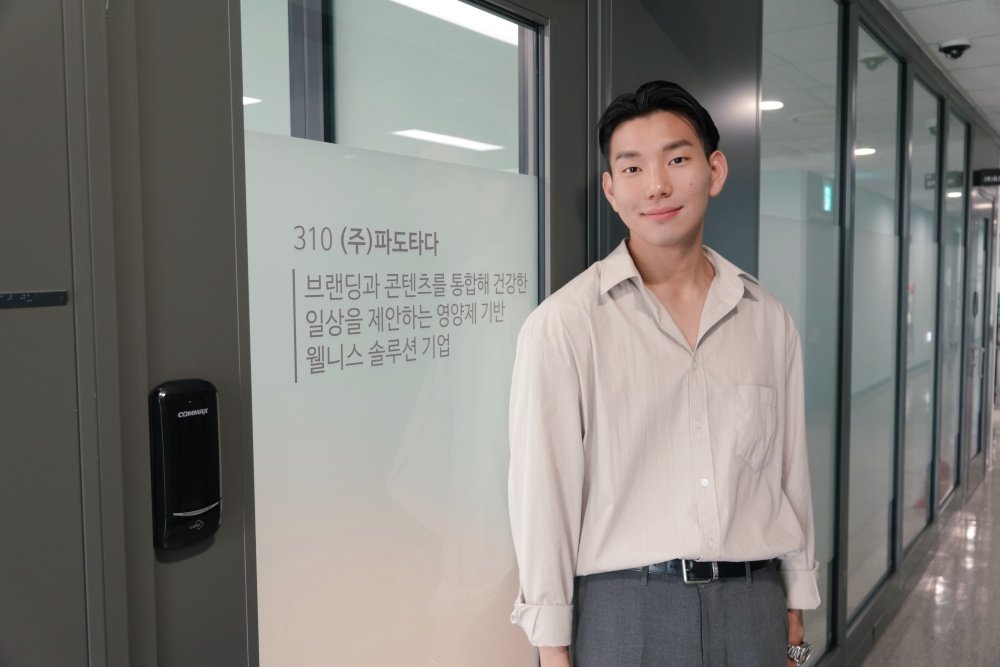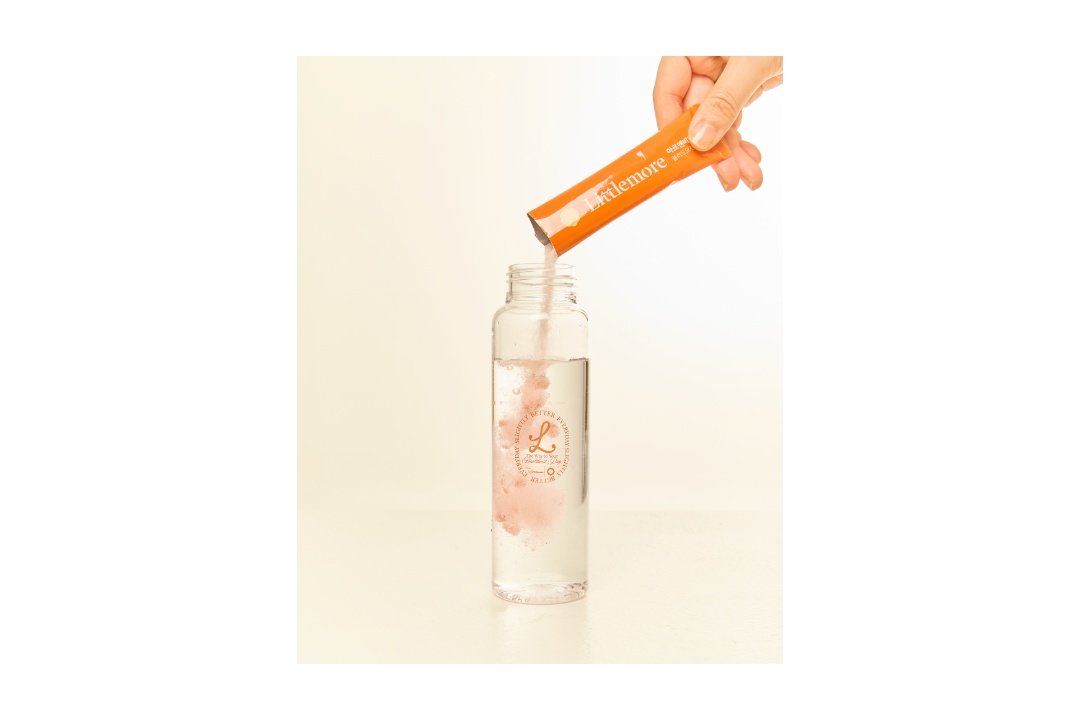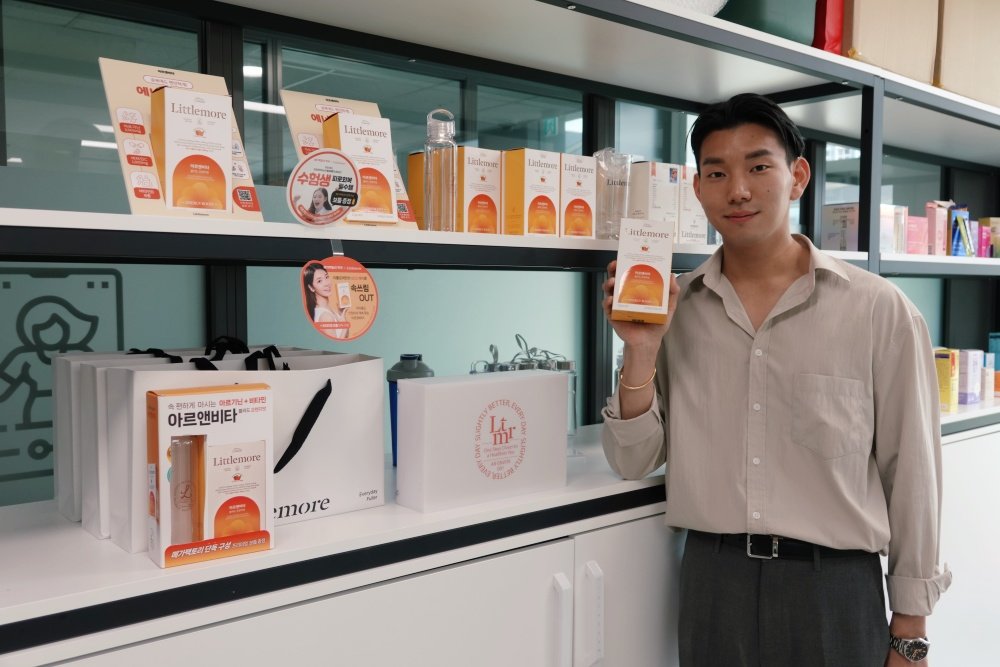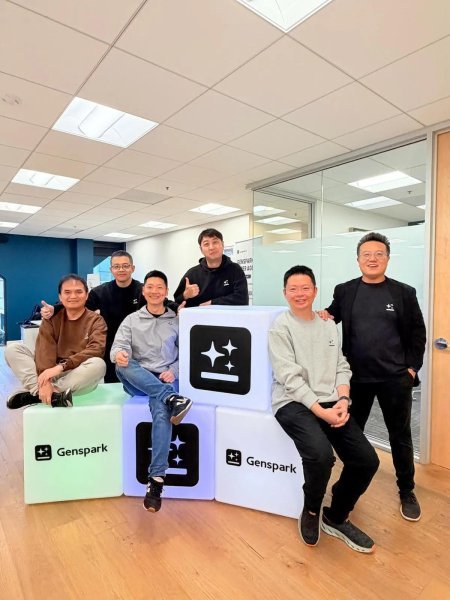
MedTech
Padotada Launches Customer-Centric Supplements Initiative
Dong-A Ilbo |
Updated 2025.10.17
[Seoul City University has been leading youth entrepreneurship and regional innovation since 2022, under the vision of 'The Most Seoul-like Influence, The Most Global Value' with the 'Seoul Impact' project. The university particularly supports startups in AI-based urban innovation and social impact fields, creating a sustainable startup ecosystem where technology and social value harmonize. It was selected as an excellent case in the field of regional revitalization in the Seoul Campus Town project and received an A+ grade in the 2024 Seoul Campus Town performance evaluation. IT Donga introduces the growth stories and innovative achievements of AI startups fostered by Seoul City University.]
“We will change the paradigm of the existing health functional food market.”
As interest in health increases, more people are taking health functional foods such as supplements and vitamins. According to the Korea Health Functional Food Association, the domestic health functional food market expanded from KRW 5 trillion in 2020 to KRW 6.044 trillion in 2024. Particularly, the purchasing proportion of health functional foods among the 2030 generation is rapidly increasing. However, there are voices expressing inconvenience behind the rapidly growing health functional food market. Health functional foods can cause stomach discomfort if taken on an empty stomach, and the process of taking them several times a day can be cumbersome.
A health and food tech startup is addressing these inconveniences with its unique technology, bringing a new breeze to the health functional food market. The protagonist is PADOTADA, which operates the wellness brand Littlemore. CEO Ko Jun-seong discussed the differences from existing products and the challenges of expanding overseas.
Entrepreneurship centered on supplements from gyms to salad specialty stores
Founded in 2023, PADOTADA is a company specializing in OEM production and sales of supplements. The unique company name embodies the beliefs of CEO Ko Jun-seong and the team members. CEO Ko explained, “The sea does not get wet with drizzle. It symbolizes the will to ride over even big waves of adversity without being swayed by small matters.”
Why did CEO Ko Jun-seong start PADOTADA? In 2018, he entered the Department of Food and Nutrition at Hanyang University and worked part-time as a gym trainer, a hobby he enjoyed. At the time, body profile photography became popular, and by helping with diet management using his major, he became a preferred trainer among gym members. He then acquired a gym with a monthly sales of about KRW 15 million in 2022, embarking on his first entrepreneurial journey. With unique services such as diet and supplement management and delivery, he succeeded in increasing the monthly sales to over KRW 30 million within two months, demonstrating his business acumen. However, excessive expenses for repairing outdated equipment and facilities led to its closure.
He did not stop there. In 2023, CEO Ko embarked on his second entrepreneurial venture with the salad specialty store Seedweed. Based on his gym startup experience, he personally handled everything from location selection to menu composition. The key was supplementing the salad menu with nutritional supplements, which was a masterstroke. As a result, Seedweed stood out among the flood of salad specialty stores.
CEO Ko recalled, “Seedweed opened in a 7-pyeong space in Sinchon, Seodaemun-gu, Seoul, where there are many female customers. With my major in food and nutrition, I knew well about nutritional components. Selling salads and supplements as a set received a great response from customers. Self-employed people often say they need to earn the rent within three days, and we exceeded that level.”
After achieving unexpected profits from operating Seedweed, CEO Ko sold the store and entered the health functional food market with about three years of experience and know-how. He realized the importance of customer-centered supplement development. He stated, “I wanted to solve the problems customers commonly face in the health functional food market, such as stomach discomfort or cumbersome intake methods, and lack of trust. Above all, I established PADOTADA to create a wellness brand that proposes ‘a slightly better life’ rather than just selling products.”
Improving existing supplement drawbacks… Developing personalized nutrition management solutions
The first product of PADOTADA's wellness brand Littlemore was 'Ar&Vita'. Ar&Vita was launched as a powder drink base containing 3000mg of arginine, 1000mg of vitamin C, and eight types of vitamin B. It features the application of PADOTADA's self-developed GCC-Littlemore formula (cabbage extract, fermented calcium, and probiotic complex) technology, which alleviates stomach discomfort when taken on an empty stomach and enhances absorption. This technology has also been patented. Additionally, it can be consumed deliciously like a drink with blood orange flavor and can be easily dissolved in 200-250ml of water.
CEO Ko stated, “Customer feedback showed a high preference for arginine. Arginine helps improve blood circulation, enhance exercise performance, and boost immunity. That’s why we chose arginine for our first product. However, arginine is known to cause stomach discomfort when taken on an empty stomach. To address this drawback, we continued external expert consultations and repetitive sampling, and after about a year, we were able to officially launch Ar&Vita.”
The second product following Ar&Vita is 'Slim&Glow', scheduled for release at the end of October this year. Slim&Glow combines bromelain, excellent for reducing swelling, with collagen, known for its moisturizing effect. Existing supplements specialized in reducing swelling often have the drawback of causing dry skin. Slim&Glow compensates for this with collagen content. Notably, it packages liquid (30ml) and tablets (1g) together in a film pouch, allowing for smooth swallowing and rapid absorption.
Additionally, CEO Ko is focusing on the research and development of 'Vita Craft', a personalized nutrition management solution through in-body biomarkers. Vita Craft is a smart dispenser that provides customized nutritional drink solutions by assessing health status through urine tests, one of the biomarkers. It particularly integrates PADOTADA's AI-based personalized nutrition provision technology with in-body biomarker nutrition assessment technology, enhancing the accuracy of necessary nutrients.
CEO Ko stated, “Vita Craft plans to secure higher quality health data through collaboration with Hanyang University’s Food and Nutrition Research Lab and Hanyang University Guri Hospital,” adding, “We are completing prototypes and working on miniaturization and product certification. Through continuous research and development, we will also enhance the accuracy of nutrient recommendations.”
Overcoming challenges through R&D enhancement and branding transition
CEO Ko faced several challenges while operating PADOTADA. Firstly, it was not easy for a startup’s new brand to gain trust in a health functional food market dominated by large corporations. Moreover, the high initial costs from product development to certification and marketing played a role. CEO Ko stated, “We solved the initial funding issue by combining government support projects and self-investment attraction,” adding, “The support from Seoul City University’s Campus Town was also a great help.”
Moreover, the offline experience accumulated from gyms and salad specialty stores became a concern when transitioning to a D2C (Direct-to-Consumer) business model. CEO Ko stated, “When operating gyms and salad specialty stores, I could immediately see customers’ expressions and reactions. However, when selling Ar&Vita and transitioning to an online focus, the biggest challenge was how to build a trust relationship with invisible customers,” adding, “I also contemplated developmental directions in terms of customer experience (AX, Audience Experience) and digital experience (DX, Digital Experience), not just selling supplements.”
CEO Ko found a breakthrough through R&D enhancement and branding transition. By improving taste and safety through external expert consultations and repetitive sampling, and clarifying brand identity with the message of ‘a slightly better day’.
Furthermore, CEO Ko diversified sales channels offline beyond online. He secured sales channels from pharmacies to gyms. This alleviated initial funding issues and successfully expanded customer contact points. The past offline business experience shone through.
Preparing for overseas expansion, aiming for a global wellness brand
CEO Ko's efforts led to tangible results. After its domestic release, the initial production of Ar&Vita sold out completely. By diversifying sales channels, sales increased more than three times compared to last year. In addition to starting exports to China, Australia, and Canada, a joint product development proposal was received from Thailand.
PADOTADA was also selected as a resident company of the AI Impact Lab at Seoul City University’s Campus Town, recognizing its technology and potential. CEO Ko stated, “After being selected as a resident company of the AI Impact Lab, we are receiving various support from Seoul City University’s Campus Town, including mentoring, consulting, and commercialization support funds,” adding, “We were provided with a stable startup incubating space, reducing initial cost burdens and allowing us to focus on work. We also received specialized mentoring related to overseas expansion, marketing, and investment attraction, which greatly helped in concretizing our business direction.”
PADOTADA's next goal is clear. In the short term, it aims to stabilize the domestic market for key products, including Ar&Vita, and expand overseas sales channels. In the medium to long term, it aims to grow into a global wellness brand.
CEO Ko emphasized, “To expand overseas, we plan to strengthen cooperation with partners in each country and integrate the influencer-centered group buying model with the K-wellness trend. Vita Craft is also being prepared for commercialization.”
PADOTADA's ultimate goal is to establish a data-based personalized nutrition and lifestyle management service. CEO Ko stated, “I judged that merely selling supplements would not allow us to grow into a large company. To leap and grow bigger, AX and DX are essential, and we will strengthen these aspects as we move forward.”
CEO Ko’s wellness journey, which turns adversity into opportunity, continues through PADOTADA. As it ambitiously challenges the health functional food market dominated by large corporations with customer-centered products, its next steps are anticipated.
IT Donga Reporter Park Gwi-im (luckyim@itdonga.com)
“We will change the paradigm of the existing health functional food market.”
As interest in health increases, more people are taking health functional foods such as supplements and vitamins. According to the Korea Health Functional Food Association, the domestic health functional food market expanded from KRW 5 trillion in 2020 to KRW 6.044 trillion in 2024. Particularly, the purchasing proportion of health functional foods among the 2030 generation is rapidly increasing. However, there are voices expressing inconvenience behind the rapidly growing health functional food market. Health functional foods can cause stomach discomfort if taken on an empty stomach, and the process of taking them several times a day can be cumbersome.
Ko Jun-seong, CEO of PADOTADA / Source=IT Donga
A health and food tech startup is addressing these inconveniences with its unique technology, bringing a new breeze to the health functional food market. The protagonist is PADOTADA, which operates the wellness brand Littlemore. CEO Ko Jun-seong discussed the differences from existing products and the challenges of expanding overseas.
Entrepreneurship centered on supplements from gyms to salad specialty stores
Founded in 2023, PADOTADA is a company specializing in OEM production and sales of supplements. The unique company name embodies the beliefs of CEO Ko Jun-seong and the team members. CEO Ko explained, “The sea does not get wet with drizzle. It symbolizes the will to ride over even big waves of adversity without being swayed by small matters.”
Why did CEO Ko Jun-seong start PADOTADA? In 2018, he entered the Department of Food and Nutrition at Hanyang University and worked part-time as a gym trainer, a hobby he enjoyed. At the time, body profile photography became popular, and by helping with diet management using his major, he became a preferred trainer among gym members. He then acquired a gym with a monthly sales of about KRW 15 million in 2022, embarking on his first entrepreneurial journey. With unique services such as diet and supplement management and delivery, he succeeded in increasing the monthly sales to over KRW 30 million within two months, demonstrating his business acumen. However, excessive expenses for repairing outdated equipment and facilities led to its closure.
Supplements and salad menu sold while operating Seedweed / Source=PADOTADA
He did not stop there. In 2023, CEO Ko embarked on his second entrepreneurial venture with the salad specialty store Seedweed. Based on his gym startup experience, he personally handled everything from location selection to menu composition. The key was supplementing the salad menu with nutritional supplements, which was a masterstroke. As a result, Seedweed stood out among the flood of salad specialty stores.
CEO Ko recalled, “Seedweed opened in a 7-pyeong space in Sinchon, Seodaemun-gu, Seoul, where there are many female customers. With my major in food and nutrition, I knew well about nutritional components. Selling salads and supplements as a set received a great response from customers. Self-employed people often say they need to earn the rent within three days, and we exceeded that level.”
After achieving unexpected profits from operating Seedweed, CEO Ko sold the store and entered the health functional food market with about three years of experience and know-how. He realized the importance of customer-centered supplement development. He stated, “I wanted to solve the problems customers commonly face in the health functional food market, such as stomach discomfort or cumbersome intake methods, and lack of trust. Above all, I established PADOTADA to create a wellness brand that proposes ‘a slightly better life’ rather than just selling products.”
Improving existing supplement drawbacks… Developing personalized nutrition management solutions
The first product of PADOTADA's wellness brand Littlemore was 'Ar&Vita'. Ar&Vita was launched as a powder drink base containing 3000mg of arginine, 1000mg of vitamin C, and eight types of vitamin B. It features the application of PADOTADA's self-developed GCC-Littlemore formula (cabbage extract, fermented calcium, and probiotic complex) technology, which alleviates stomach discomfort when taken on an empty stomach and enhances absorption. This technology has also been patented. Additionally, it can be consumed deliciously like a drink with blood orange flavor and can be easily dissolved in 200-250ml of water.
Ar&Vita is the first product of PADOTADA's wellness brand Littlemore / Source=PADOTADA
CEO Ko stated, “Customer feedback showed a high preference for arginine. Arginine helps improve blood circulation, enhance exercise performance, and boost immunity. That’s why we chose arginine for our first product. However, arginine is known to cause stomach discomfort when taken on an empty stomach. To address this drawback, we continued external expert consultations and repetitive sampling, and after about a year, we were able to officially launch Ar&Vita.”
The second product following Ar&Vita is 'Slim&Glow', scheduled for release at the end of October this year. Slim&Glow combines bromelain, excellent for reducing swelling, with collagen, known for its moisturizing effect. Existing supplements specialized in reducing swelling often have the drawback of causing dry skin. Slim&Glow compensates for this with collagen content. Notably, it packages liquid (30ml) and tablets (1g) together in a film pouch, allowing for smooth swallowing and rapid absorption.
Additionally, CEO Ko is focusing on the research and development of 'Vita Craft', a personalized nutrition management solution through in-body biomarkers. Vita Craft is a smart dispenser that provides customized nutritional drink solutions by assessing health status through urine tests, one of the biomarkers. It particularly integrates PADOTADA's AI-based personalized nutrition provision technology with in-body biomarker nutrition assessment technology, enhancing the accuracy of necessary nutrients.
CEO Ko stated, “Vita Craft plans to secure higher quality health data through collaboration with Hanyang University’s Food and Nutrition Research Lab and Hanyang University Guri Hospital,” adding, “We are completing prototypes and working on miniaturization and product certification. Through continuous research and development, we will also enhance the accuracy of nutrient recommendations.”
Overcoming challenges through R&D enhancement and branding transition
CEO Ko faced several challenges while operating PADOTADA. Firstly, it was not easy for a startup’s new brand to gain trust in a health functional food market dominated by large corporations. Moreover, the high initial costs from product development to certification and marketing played a role. CEO Ko stated, “We solved the initial funding issue by combining government support projects and self-investment attraction,” adding, “The support from Seoul City University’s Campus Town was also a great help.”
PADOTADA found a breakthrough through R&D enhancement and branding transition / Source=IT Donga
Moreover, the offline experience accumulated from gyms and salad specialty stores became a concern when transitioning to a D2C (Direct-to-Consumer) business model. CEO Ko stated, “When operating gyms and salad specialty stores, I could immediately see customers’ expressions and reactions. However, when selling Ar&Vita and transitioning to an online focus, the biggest challenge was how to build a trust relationship with invisible customers,” adding, “I also contemplated developmental directions in terms of customer experience (AX, Audience Experience) and digital experience (DX, Digital Experience), not just selling supplements.”
CEO Ko found a breakthrough through R&D enhancement and branding transition. By improving taste and safety through external expert consultations and repetitive sampling, and clarifying brand identity with the message of ‘a slightly better day’.
Furthermore, CEO Ko diversified sales channels offline beyond online. He secured sales channels from pharmacies to gyms. This alleviated initial funding issues and successfully expanded customer contact points. The past offline business experience shone through.
Preparing for overseas expansion, aiming for a global wellness brand
CEO Ko's efforts led to tangible results. After its domestic release, the initial production of Ar&Vita sold out completely. By diversifying sales channels, sales increased more than three times compared to last year. In addition to starting exports to China, Australia, and Canada, a joint product development proposal was received from Thailand.
PADOTADA was also selected as a resident company of the AI Impact Lab at Seoul City University’s Campus Town, recognizing its technology and potential. CEO Ko stated, “After being selected as a resident company of the AI Impact Lab, we are receiving various support from Seoul City University’s Campus Town, including mentoring, consulting, and commercialization support funds,” adding, “We were provided with a stable startup incubating space, reducing initial cost burdens and allowing us to focus on work. We also received specialized mentoring related to overseas expansion, marketing, and investment attraction, which greatly helped in concretizing our business direction.”
PADOTADA's ultimate goal is to establish a data-based personalized nutrition and lifestyle management service / Source=IT Donga
PADOTADA's next goal is clear. In the short term, it aims to stabilize the domestic market for key products, including Ar&Vita, and expand overseas sales channels. In the medium to long term, it aims to grow into a global wellness brand.
CEO Ko emphasized, “To expand overseas, we plan to strengthen cooperation with partners in each country and integrate the influencer-centered group buying model with the K-wellness trend. Vita Craft is also being prepared for commercialization.”
PADOTADA's ultimate goal is to establish a data-based personalized nutrition and lifestyle management service. CEO Ko stated, “I judged that merely selling supplements would not allow us to grow into a large company. To leap and grow bigger, AX and DX are essential, and we will strengthen these aspects as we move forward.”
CEO Ko’s wellness journey, which turns adversity into opportunity, continues through PADOTADA. As it ambitiously challenges the health functional food market dominated by large corporations with customer-centered products, its next steps are anticipated.
IT Donga Reporter Park Gwi-im (luckyim@itdonga.com)
AI-translated with ChatGPT. Provided as is; original Korean text prevails.
ⓒ dongA.com. All rights reserved. Reproduction, redistribution, or use for AI training prohibited.
Popular News















